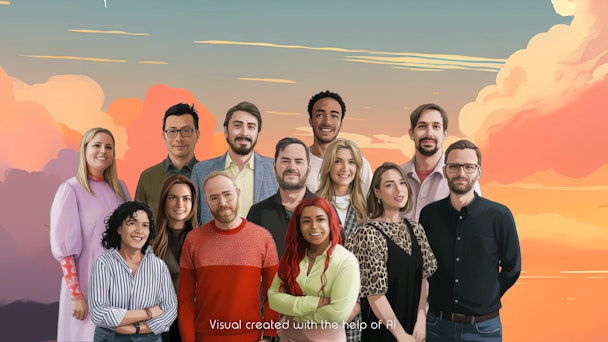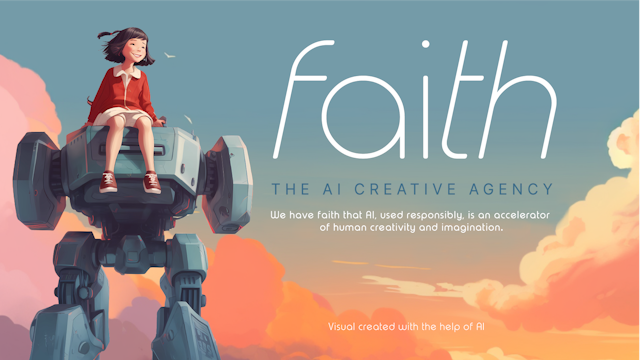‘It’s not about efficiency, it will help us creatively’: Sage on VCCP’s AI agency
The enterprise software brand hopes to benefit from new AI-focused agency Faith.

VCCP Faith’s new team; the image was created using an AI tool / VCCP
Generative AI tools could “transform” the way Sage communicates with customers says its chief marketing officer Cath Keers. The enterprise SaaS (software as a service) company is the founding client of Faith, an AI-focused creative agency launched by VCCP.
According to Faith chief executive Michael Sugden, generative AI is already “part of the fabric” at VCCP, which intends the new business unit to provide “a lightning rod of progress” for AI within the group. The British advertising group was already Sage’s global creative agency.
Advertisement
Keers says that the primary benefits of AI in Sage’s marketing strategy would be qualitative, not quantitative. “It’s clear there is huge potential for AI to enable us to generate creative assets rapidly and flexibly. But rather than thinking about efficiency, think what the new agility and speed enables us to do creatively.”
This lies in contrast with the other main use case for generative AI within agencies – the potential to save time and billable hours.
Keers says: “The long-term goal is for AI to elevate the work of humans by providing us with powerful insights that help us deliver a more personalized and human experience for our customers. Something that helps us bolster our human to human marketing approach.
“Harnessed in the right way, AI in the creative sphere can also accelerate insight and inspire the imagination. In principle, AI l could enable us to create a whole set of executions for a single DOOH placement that are changed because of what has happened in the news that afternoon.
“It enables us to react at the speed of culture rather than the current time lag created by production. It allows us to achieve a level of personalization that could transform the relevance and performance of our messaging through using AI to factor in contextual elements such as geography, time of day and what we know about our customers.”

Statement of Faith
Like VCCP’s other spinoff ventures, Faith features a distinct agency brand identity: a lumbering robot that replaces the group’s familiar bear mascot. The assets for the brand identity took just two days to create using MidJourney and Stable Diffusion, making it perhaps the first agency logo to be designed by an AI. “You can get to a really high-quality product really quickly and, to be honest, it frees up the teams to do more important stuff,” says Sugden.
VCCP claims the new AI outfit already serves a number of clients in addition to Sage, though it declines to name them. The Faith team – which is comprised of 14 creative strategists, coders, UX engineers and data analysts – is already deploying tools from Open.AI, Adobe, Microsoft, Google and Eleven Labs.
“Our agency positioning is that we have faith that AI, used responsibly, is an accelerator of human creativity and imagination,“ says Sugden. “We’ve already seen that it’s additive to what we’re doing. It allows us to do things we couldn’t do two or three weeks ago.“
Advertisement
Faith isn’t the first creative agency built around generative AI to launch this year; DDB launched its Rand agency in February, while Ogilvy and Media.Monks created specialized teams to push the practice forward in March and dozens of other ad agencies have begun using the tech without calving off specialist teams. AI work won’t be restricted to Faith either, as BBDO has attempted to do in the US.
But Sugden argues that creating a distinct outfit for Faith is the best way of progressing VCCP’s adoption of the tech. “Faith is 100% additive to all of the generative uses that are already happening,” he says.
“The reason we are making it a separate agency is so the team are unencumbered by existing workstreams – and, if we’re being completely honest, uninhibited by existing methods and beliefs.” In the long-term, there’s a chance the agency will be folded back into the parent brand – as Kin, VCCP’s social agency, eventually was. “To us, it’s no different to how we reacted to the internet or the smartphone or social media. You’ve got to be curious and ambitious and have a challenger mindset.”
VCCP Partnership chief strategy officer Michael Lee will, like Sugden, double up his role within Faith. “Without Faith, the learnings would stay in pockets,” he warns. “The people who would naturally be interested in technology and innovation would have an exclusivity of knowledge. Given the speed [of development] and given the likelihood that some competitor will come in with a very AI-first approach, we don’t want to find ourselves lagging far behind when it comes to taking advantage of the huge potential that we can see from generative AI.”
Suggested newsletters for you
Experimental approach
That doesn’t mean the company is pursuing AI deployment totally hurly-burly. Lee says that common sense and caution “need to accompany curiosity”. The group has drawn up an extensive AI usage policy to guide staff right, focusing on transparency when AI tools are used, fact-checking of generated content and legal compliance.
Key to the agency’s model is a way of working that the team dubs ‘parallel tracking’. For clients that consent, Faith will be given the same briefs as other VCCP teams and aim to spin up alternative ideas. The idea is to shadow the mainstream, rather than compete outright with it.
“It’s a pretty standard process from scientific exploration,” says Lee. “We don’t want this to be an abstraction, we want to test on real client briefs or run them in parallel with existing processes.”
That alternative might be a straightforward use of MidJourney to create new imagery in place of another method, a change to the production or creative process, or more holistic alternatives to conventional work. And, in keeping with classic scientific method, ‘failure’ for Faith should be just as instructive as success.
“Part of the freedom of doing an experiment is we don’t know what it will be like,” says Lee. “It might be terrible, but it might take you conceptually to new places.“
Sage is no stranger to using AI within its business. The company uses algorithms and machine-learning systems to detect possible financial fraud, for example. Sugden says: “What we’re trying to do with it is to better understand the applications for marketing. To do that with a brand like Sage is a dream come true for Faith.”
Keers says Sage is comfortable with the experimental approach and hasn’t committed to concrete measures for a return on this investment. “It’s too early to say and we would be wary of promising anything in terms of hard KPIs to the business when the pace of change could render one set of learnings obsolete within weeks rather than months,” she says.
“What I can say is that we, as a business, have a strong measurement and evaluation culture and that we constantly test and learn our marketing activity. This will be no different.”

